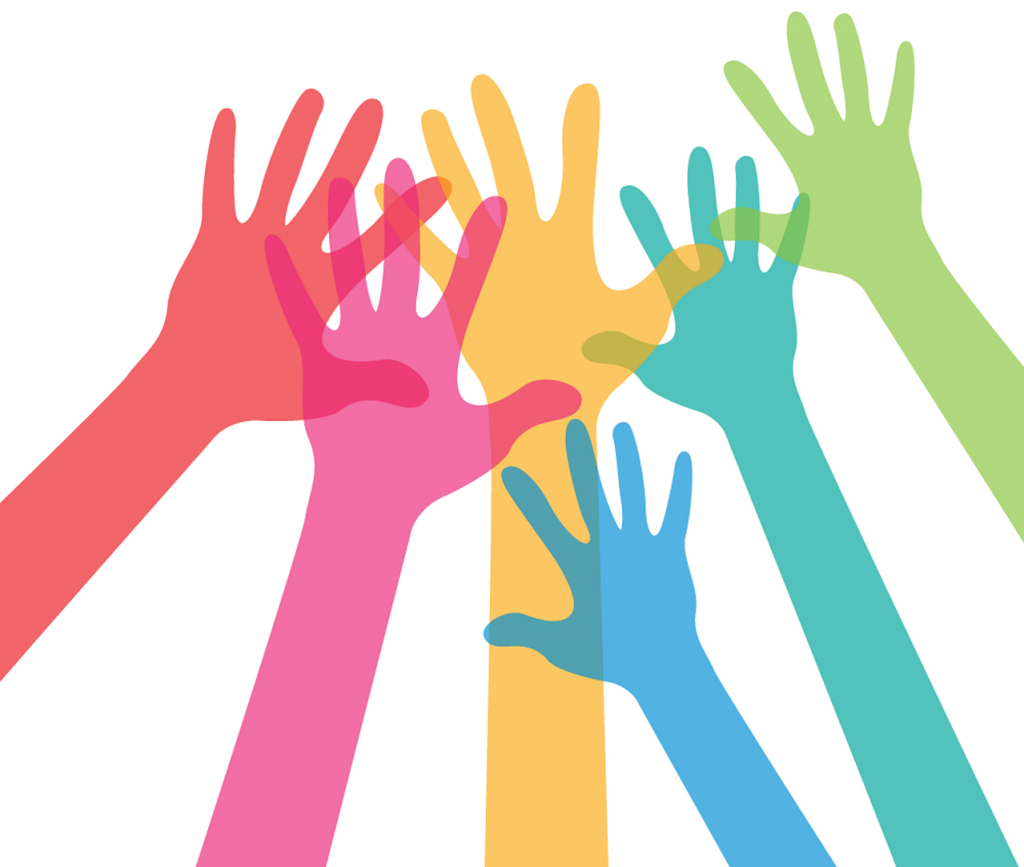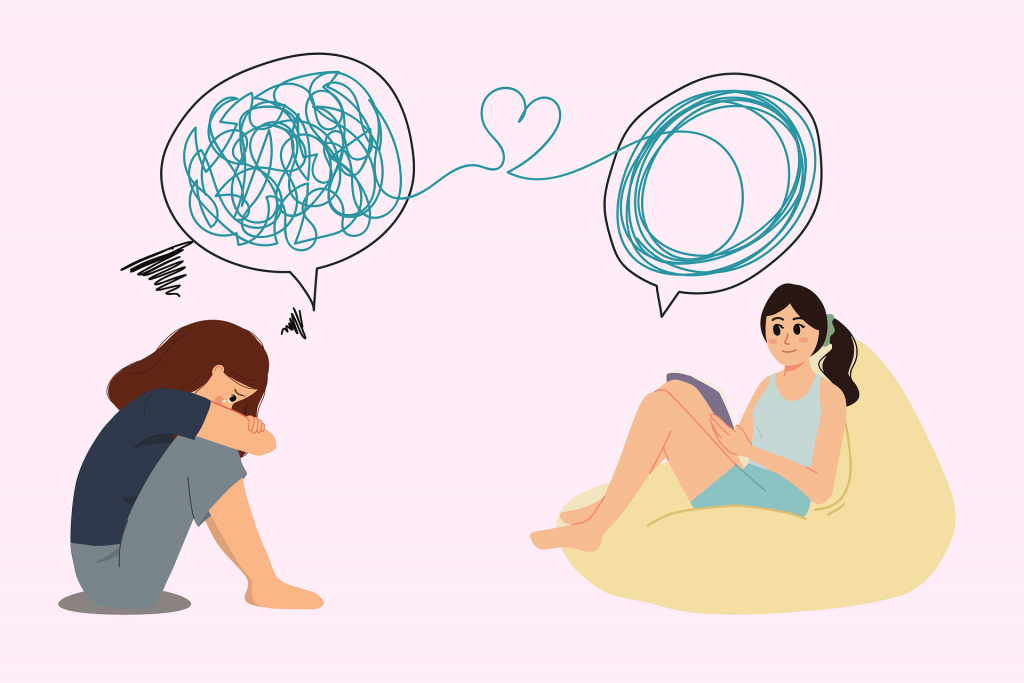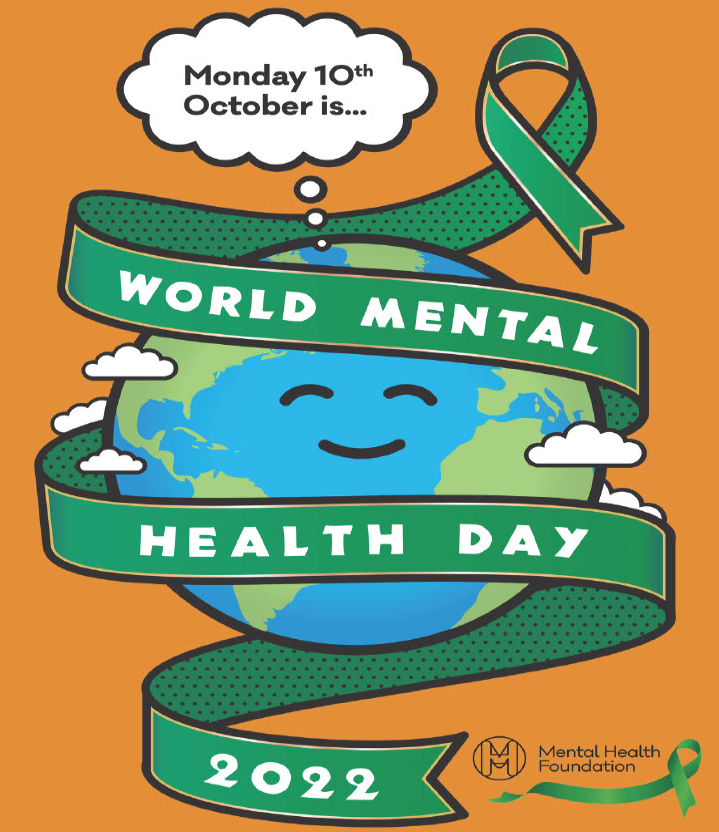Featured image World Mental Health Day poster is sourced from World Mental Health Foundation
Check-in with yourself, learn, and make the world a better place
Chosen theme: ‘Make Mental Health & Well-Being for All a Global Priority’
One in eight people live with a mental disorder (World Health Organisation). Those are pretty high numbers: just look around in a busy classroom or walking down the street or being on public transport. If you do some rough mental calculations, you will realise how common these conditions actually are, and how little help most of them – us! – currently get.
We learned much from the pandemic, and how it exposed a 25% rise of anxiety and depression number of cases during the first year alone (WHO). One more year, we are invited to get to know the numbers and the threats that people everywhere face when battling mental health issues, so we can improve access to treatments everywhere.
The World Federation for Mental Health (WFMH) celebrated the first Mental Health Day back on the 10 October 1992. Thirty years later there have been a variety of topics chosen for each anniversary and this year we focus on ‘Make Mental Health & Well-Being for All a Global Priority’. The consequences of Covid-19, paired with current wars, displacements, and climate change challenges, have shown the shortcomings of appropriate systems for the support of people’s mental health everywhere. The ongoing campaigning about the different aspects of this global shortage, affords much needed visibility and helps change the world for the better. The president of WFMH, Dr Nasser Loza, said:
‘In 2021 the UN Secretary-General said that, without determined action, the impact of COVID 19 on mental health may last far longer than the pandemic itself. He urged us to act to redress the glaring inequalities exposed by the pandemic, including the inequality in access to mental health services… In high income countries over 75% of people with depression have reported that they do not receive adequate care and in low and middle-income countries over 75% of people with mental health conditions have received no treatment at all.’
Challenging stigmas in ourselves and others
At least one in four people in England will experience some kind of mental health problem every year (Mind, UK). And this number is still a low estimate. It is not unreasonable then to realise that each of us might be susceptible to suffering one issue or another regarding our mental health – even if we think that we are just fine. It is important to realise this about ourselves and about others around us, as this means that we will be able to give or receive the necessary help when it matters.
Globally, stigma can take many forms, and can come from not only a person’s closets circle or community, but also from health professionals themselves and workplaces. It is a slow process to shift these attitudes, and that is why speaking up, access to information, and big mental health campaigns such as the present one, have shown in the past a very positive impact in addressing stigma and discrimination.
Unfortunately, many people suffering from mental health issues today, still find it difficult to talk about it for fear of facing discrimination and also unfair stereotyping. Mind and Mental Health Org UK explore these topics and also advocate to put an end to these injustices. You can read more about it by following the links!

How to check on your mental health
If you are feeling overwhelmed, or that you don’t seem to escape low moods, one of the best places to start is this NHS test for a self-assessment. Anyone can do it and taking the quiz does not mean immediate referral to services. Instead, this is a free tool for you to get a better picture of the current state of your mental health. You will get some advice, depending on your results, including resources and also self-referral options to local services, if this is what you wish.
Remember that if you are a part of CCCU, you can also access our Mental Health and Wellbeing Support options, including contact to the Mental Wellbeing Team. Starting university is such an exciting part of your life, but it has its own set of challenges too. However, you are not alone: we want to support you during your whole student journey. Don’t be shy and have a little explore! You will find tonnes of helpful options on these CCCU links.
It is overwhelming to consider all of our thoughts, feelings, symptoms, etcetera, all at once and try to find the right path for us among all that noise. That is why there are some charities that have designed helpful guidance with the first steps to take, so we don’t feel alone and can at least take those first steps with a bit more confidence:
- Get Help Now, by Mind.
- STOPP by Get Self Help.
It is always key to identify the reasons that are causing our distress in order to get better. Sometimes they are very clear: money worries, assignments at university, family and friends’ troubles, insecurities… But sometimes, the reasons may run much deeper, and we may not even be consciously aware of them. Often, we get a combination of both. There are times when our anxiety or low moods are more obvious: particular days, or times of the day, certain triggers, etc. Becoming aware of these patterns – our own personal red flags – is how we can start helping ourselves and making the use of other resources work better for us. Not everyone is the same, so of course different people might experience different symptoms.
And what about neurodivergent folk? Neurodiversity is an umbrella term to describe alternative thinking styles such as dyslexia, dyspraxia, dyscalculia, autism and attention deficit hyperactivity disorder (ADHD). This definition was coined by the sociologist Judy Singer in the 1990’s (Learning Disability Today). Approximately one in seven individuals has a neurodiverse condition, and people with these conditions are also more likely to develop anxiety or depression, due to the practice of suppressing or ‘masking’ their traits. Make sure to check our CCCU support options for disabilities and mental health conditions too.

We all need to take the time to get to know ourselves and which of our own behaviours are indicators of our worsening mental health. These may include withdrawing socially more often and some physical symptoms too, like finding it harder to fall asleep or trying to relax, getting random pains, or breathing shallowly throughout the day, which puts your body in an anxious state – ‘fight or flight’. Regarding this, something we easily overlook is our posture: you might be often hunching, and this reduces your chest capacity for breathing more deeply.
Stress alone can easily disturb your immunity and cause a wide variety of symptoms that can make you feel as though you are ill with something else entirely. This can be dangerous as it can cause you worry even more, causing a spiral of increased stress and worry.
Techniques to try on your own
Often, one of the very first things we need to realise is how much we like to be in control. We keep going, ignoring the signs and in denial of needing to look critically at ourselves. Sound familiar?
This is why the technique of mindfulness has become so widespread:
‘Mindfulness is a technique you can learn which involves noticing what’s happening in the present moment, without judgement. You might take notice and be aware of your mind, body or surroundings. The technique has roots in Buddhism and meditation, but you don’t have to be spiritual, or have any particular beliefs, to try it.’
Mind UK
You can learn more about it and find exercises to try on the Mind UK website too.
Something many people find very useful, is to take some time to escape from fixed habits at least a few times every week and introduce something new in your day. Try some journaling, to explore your thoughts, emotions, and worries, or some meditation or gentle exercise and breathing techniques to force you to return to the present moment and get better at spotting worries and other causes of your unhappiness.
If you feel like you are constantly worrying too much, stressed, and generally experiencing racing thoughts: too many things in your mind, concerns, stuff that needs dealing with. You can fix this by having designated time daily, to think about all these things instead of having them cluttering your headspace constantly and not being able to switch off. This is called ‘worry time’ and here you can think of solutions, plan a timescale or reach an understanding that certain things are too big, and you simply have no control over. Learn to be at peace and let go.
But if you have become tangled in a net of never-ending worries, and just can’t make it stop, this may be a symptom of suffering a generalised anxiety disorder instead (GAD). There is another fantastic technique for you to try in this case, called the Worry Tree. You can learn more about it and put it in practice, following the advice on the Get Self Help website.
Anxious thoughts and feelings are often connected to depression too, which according to the World Health Organisation, this is an illness suffered by an estimate of 280 million people worldwide! Therefore, don’t feel ashamed if you are feeling depressed whatever your circumstances, as it truly can affect anyone. You can explore the Depression Self Help site and the Young Minds Charity, As there isn’t a size that fits all, you may want to explore different techniques of self-help, depending on the problems you are experiencing. The Self-Help website has a list of these problems, and tailored advice for each of them.
In addition, I would like to add to this list a concept that has personally helped me hugely: core beliefs. According to authors Dr. Gray Otis, Sandi Williams, and Dr. James Messina, who together wrote the book Key Core Beliefs:
‘Core Beliefs are the most deeply held, key beliefs we have about ourselves. They can exist consciously or subconsciously, and they substantially shape our perceptions, thoughts, emotions, and actions. We accept these beliefs as true because they are based on our accrued experiences. For example, someone who routinely takes in stray dogs or volunteers might reasonably have the Positive Core Belief, ‘I am generous.’ However, many beliefs are inaccurate and untrue Negative Core Beliefs. These beliefs disrupt our lives. Resolving negative, mistaken self-beliefs is central to helping us lead happier, healthier lives.’
Working through these beliefs is often part of programmes of Cognitive Behavioural Therapy (CBT).. You can find more about accessing CBT on the NHS website.

Emergency Services
Remember, that if you are struggling and find these problems too much to manage on your own, there is direct help that you can access urgently too.
Please use these services. You are not alone:
- NHS Get Urgent Help for Mental Health.
- Samaritans: Contact a Samaritan and If You are Worried about Someone Else.
- Good Thinking: Urgent Support.
- Mind: How to Get Help in a Crisis.
- Together All: In Crisis?
Library resources
The CCCU library team has put together a collection of resources on Wakelet, including books to read on about a variety of related topics – that you can get from the library -, but also further links to mental health charities and their practical exercises and workbooks. You can access it all by following this link, or by scanning this QR code:

These are a few particularly helpful quick links from the collection:
Help yourself, by helping others
What most Cognitive Behavioural Therapies (CBT) have in common, is that they emphasize the importance of having or creating a support circle of friends and/or family. Not only these people can help us connect with reality when we withdraw socially due to the worsening of our mental health, but also, talking to others and listening to their problems or situations in return, might afford us the often-unexpected chance of becoming useful.
When we are struggling with mental health problems, often our self-esteem suffers too. We doubt ourselves more, about our capabilities but also about our self-worth. If we engage in conversation with loved ones, or even in our wider community, this can help us shift the focus from ourselves to others. We become exposed to other issues, or we are given a new purpose. Even if you don’t feel like it, this may be exactly what you need to help you with getting a wider perspective of things. This can offer new approaches to our problems and also release the good hormones of feeling part of a community and feeling loved.

Every mental health problem is unique, and comparisons are pointless and quite unhelpful, if not outright hurtful. This is instead about helping ourselves, by helping others. We are a social species, and even the most introverted of us will benefit from being part of a family – be blood-related or metaphorical. When we become useful to others our sense of self-worth increases. So, when we spiral downwards, we can draw from these positive experiences to counterattack the often negatively biased beliefs about ourselves. ‘I am a mess’ can turn into ‘I can help people’ or ‘I do have good qualities’. And acquiring more evidence of these positive beliefs about ourselves, can radically change the way we see ourselves, boost our self-esteem, and fill us with confidence, which are very helpful tools when battling difficult times.
More good news if you are a part of our university: you can browse our volunteering website so that you can find volunteering opportunities and related information. We also have some general tips on how to join the local community that you can explore for inspiration. CCCU’s commitment to working with local businesses, charities, public services and communities has recently been recognised at a national level in the Higher Education sector.
In the world, access to this kind of information and resources is widely unequal. Make Mental Health & Well-Being for All a Global Priority, the theme for this year’s World Mental Health Day, aims to campaign precisely to address this. By making this problem visible, learning about the shortcomings in services and in different countries, talking to each other, defy stigmas and discriminations, we help normalise these problems, demystify them, and get better help everywhere.
A few sections from this article were taken and repurposed from the author’s personal blog on Medium – Isabel Abril: ‘Survival mode: 5 red flags we ignore about ourselves’.
 Library
Library Isabel Fernandez Abril
Isabel Fernandez Abril 1360
1360


